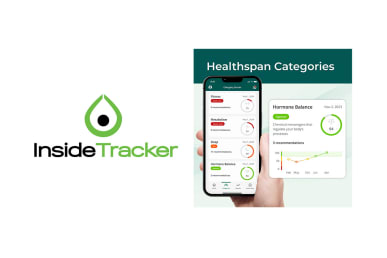
Change is the one constant in life. I don’t think I need to tell you this, ancient Greek philosophers have done it plenty. But here’s what I can tell you: This change applies to our skin, hair, and bodies naturally with time and thanks to a variety of factors. There are the obvious ones: sun exposure, environmental aggressors, lifestyle factors like diet—but don’t forget hormones.
Hormones have a huge impact on our skin, ranging from pubescent oil-prone skin and breakouts around a monthly cycle to cortisol (the stress hormone) breaking down collagen. The tricky thing about hormones is that they are influenced by almost everything: diet, sleep, mood, your environment, as well as natural fluctuations that come with maturity and age.
One change you may notice in your mid to late 30s? According to board-certified dermatologist and hormone specialist Keira Barr, M.D., you should expect a drop in the hormone progesterone. On a recent episode of Clean Beauty School, we talked all about what to expect from hormone changes. Allow us to explain the tricky case of progesterone.
Why this hormone expert wants you to pay attention to your progesterone if you’re in your 30s.
Progesterone is a sex hormone, alongside estrogen and androgens, like testosterone. All of these hormones have an effect on your skin and hair—both good and bad. “The effect of progesterone on the skin is less well defined [than estrogen] but contributes to skin elasticity, pigmentation, as well as increased circulation and sebaceous gland activity,” Barr told us previously.
“Progesterone is important for women, especially because starting in our mid to late 30s, it’s the first hormone to noticeably start to decline,” says Barr in the episode. See, menopause isn’t the only time you may go through sex hormone declines—no, the decline starts and escalates as early as your 30s.
Progesterone drop has several repercussions for the skin and body.
With progesterone’s decline, you’ll likely start to experience drier skin (thanks to decreased oil production), increased dark spots, and fine lines. But it’s not just that—you and your skin may start to feel more stressed.
“Progesterone is also known as the great calmer, right? It interplays with our neurotransmitter GABA, which helps to calm and relax the body,” says Barr. “So women in our mid to late 30s, this may be the reason you’re feeling more anxious and stressed. So you’re not really changing much—but all of a sudden you’re more anxious, you’re not sleeping as well—it may be linked to some of the changes that you’re seeing with your progesterone.”
And as we know, stress, lack of sleep, and anxiety dramatically influence our skin too: It can lead to premature aging, more sensitive skin, a compromised skin barrier, dullness, the list goes on.
So when you get to your 30s, here are a few derm-approved tips to help:
- Try breathwork when you get stressed. Research shows participants who completed 20 breathwork training sessions over eight weeks had significantly lower levels of the stress hormone cortisol compared with those who did not receive the training. Cortisol is responsible for our body’s stress response, and high levels of it can cause chronic inflammation, collagen breakdown, and skin sensitization.
- Wear sunscreen and topical antioxidants. Since dark spots and hyperpigmentation increase during this time, always protect your precious skin with SPF and brightening antioxidants, like niacinamide and vitamin C.
- Get a thicker moisturizer. Since skin gets less oily and more dry, we recommend revisiting your go-to hydrator. Opt for something thicker and dense with moisture-rice ingredients (check out our favorites!) and maybe even layer a face oil on top.
Hormones affect our skin and bodies throughout our lives. And in our 30s, in particular, progesterone will start to decline. When this happens, we may see signs of premature aging—as well as more stress, both in the skin and body.
If you’re looking for more engaging beauty conversations, listen to our new beauty podcast, Clean Beauty School. Subscribe on iTunes, Google Podcasts, or Spotify.
https://www.mindbodygreen.com/articles/what-know-about-your-30s-according-to-a-derm-and-hormone-expert








